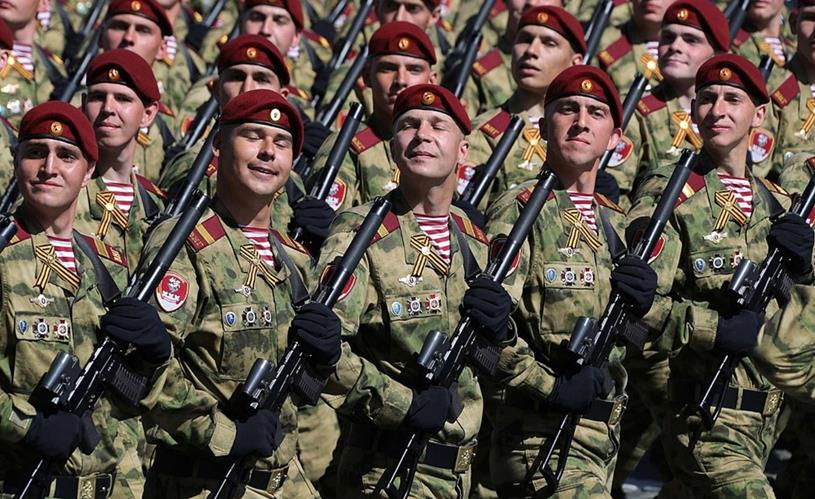With all due respect for a distinction that Chronicles Foreign Affairs Editor Srdja Trifkovic and some diplomats in America and Europe have tried to make, I can’t see how Russian President Vladimir Putin’s marching of armies into Donetsk and Lugansk earlier this week does not constitute a good old-fashioned invasion. Although Russian armies, in a sense, did walk into a region of Ukraine whose ethnically Russian inhabitants had already declared themselves to be free republics, it is highly implausible such steps were taken without close collaboration with the Russian government.
The provinces’ Russian inhabitants began shooting at Ukrainian troops after a well-equipped Russian army of 140,000 men had been massed on Ukraine’s eastern and northern borders. The use of sympathetic inhabitants within a territory that foreign armies are about to occupy has gone on throughout human history. It would be ridiculous to pretend that Putin was thrust into a situation against his will by the necessity to defend oppressed Russian minorities. As an expansionist Russian nationalist, Putin has acted exactly as I would have expected. He is retrieving territory that Soviet Russia had been forced to give up and the loss of which Putin has emotionally deplored more than once.
Unfortunately for this plan, Russia had forfeited Lugansk and Donetsk, together with the coal-and iron- rich Donbass, in a binding memorandum agreed to in Budapest in December 1994. By that agreement Russia conceded the Crimea, which Putin has since seized, together with the two provinces that his armies are now also taking back. Ukraine received its post-Soviet borders in return for giving up the nuclear weapons that the Soviets placed on its soil. This rendered the country vulnerable to Russian attacks, without the equivalent means of retaliating.
Just as in eastern Ukraine, there are sizeable Russian minorities living in the Baltic states of Estonia, Latvia, and Lithuania. Stalin moved many of these Russians in after he deported the indigenous population. What will happen if these minorities start complaining? Will Putin feel obliged to liberate them next?
Having expressed my annoyance with Putin’s actions, I should qualify by saying that I’m not sure that any American interest is immediately at stake in this situation. Certainly in comparison to the immigration invasion that is now happening on America’s southern border and to what the epicene Canadian Prime Minister Justin Trudeau is doing to create a woke totalitarian state on our northern border, Putin’s action seems small beer indeed.
Further, the neocon blah-blah comparing Putin to Hitler, which is repeated on nationwide cable channels every two minutes, makes me want to give up my dinner. Even more disgusting is the pretense that it’s all a bunch of nice “democracies” that are at odds with a “neo-Nazi” Russia. I haven’t noticed too many paradigmatic constitutional democracies on the anti-Putin side. Certainly not the corrupt Ukrainian state, which the Western media establishment and tech oligarchs now prevent the American populace from realizing is corrupt and tyrannical toward its own opposition parties.
I’ll be forthright, however, in my concern about how the traditional (non-neoconservative) right pulls its punches regarding Putin. Like others on the right, I have praised Putin’s masculine leadership, which is a trait lacking in Western leaders. I’ve also praised his amused contempt for the LGBT lobby, which both of America’s political parties serve with cringing reverence. But these reasons for admiring Putin as a political actor does not require me to applaud his outrageous behavior when he breaks agreements and strips neighboring countries of their territory.
Some Putinophiles, desperate to defend their guy, have excused his actions by insisting that Ukrainians are not a real nationality. They are, in this view, self-denying Russians whom Putin is returning to their true homeland. The last time I checked, the Ukrainians were a genuine nationality with their own language and national church. Millions of them died under Russian control during the forced famines (the Holodomor) of the 1930s. Throughout the struggle against Soviet Communism, I listened to the anti-Communist right recount the suffering of the Ukrainian people. There is no reason to suppress these still relevant historical details because we like the present Russian government more than the one that preceded it.
(Correction: The eighth paragraph of an earlier version of this article incorrectly cited the decade the Holodomor occurred as the 1920s. The correct decade is the 1930s.)
